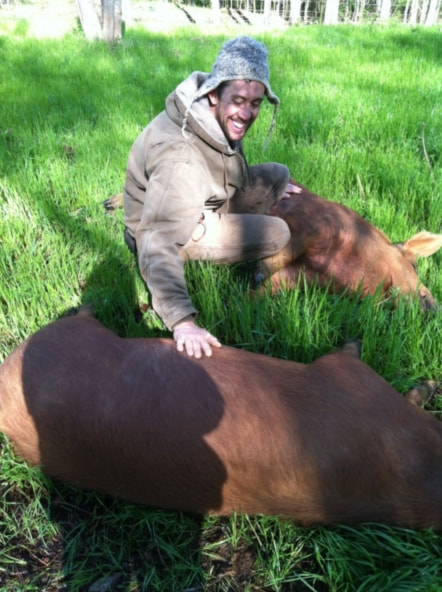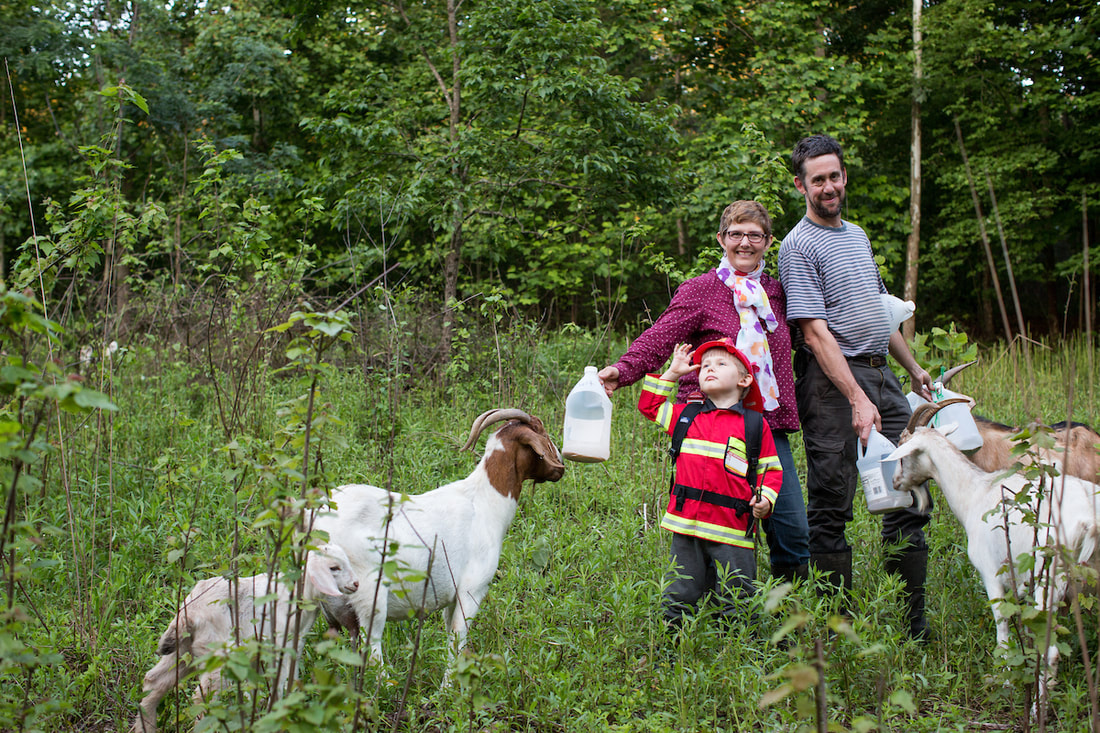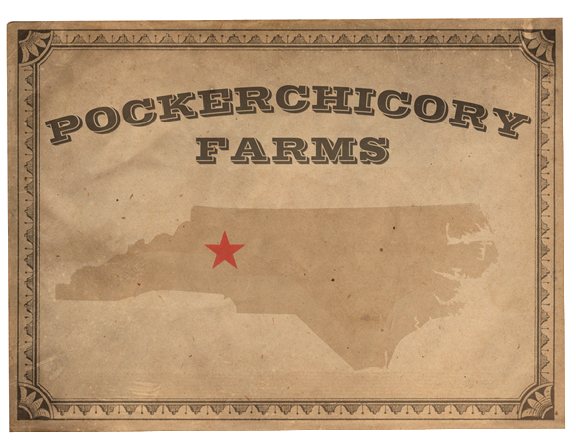About pockerchicory farms
|
Edward Marshall fell in love with this farm in the shadows of the Brushy Montains in North Iredell County, NC back in the 1990s. Through that decade and into the next, he grew an organic market garden and pastured livestock and poultry. In 2002, he left the farm, took a 9 year hiatus, and returned in 2011 with Crystal Marshall to reboot. In honor of the peoples who used to hunt and traverse this land, they searched for a Catawban connection and settled on renaming the site Pockerchicory Farms-- pockerchicory is an Algonquian word for "hickory" or "nut" as the farm is rich with black walnut and hickory.
Covered over in trees and brush, with the soil underneath flopped out from the couple of hundred years this site grew tobacco and cotton, Edward and Crystal took several years to settle on the best farming methods to heal this land, to produce awesome food, and to bring in the much needed fertility to repair the soil. |
Pockerchicory Farms produces healthy, nutrient dense food and other sustainable products. Our farms focuses on building soil and regenerating land. We steward animals humanely, and we also do our best to humanely deter predators. |
We really want you to eat well and to love the food and other natural products we produce as much as we love them.
About Edward and Crystal

Edward Marshall
704 450 7022
[email protected]
With thousands of hours of on-farm experience, Edward Marshall was one of a few commercial market garden organic farmers (vegetables, pastured poultry, pastured pigs, cut flowers) in the Iredell Co./Forsyth Co., NC areas in the 1990s till the early 2000s. After a hiatus working as a film and video editor, he returned to the Piedmont region in 2011 to found Pockerchicory Farms.
Marshall uses animals in systems for production and land reclamation as part of a Management intensive Grazing practice.
In 2015 he apprenticed for the year on an 150 cow organic dairy, and also managed its grass and rotational grazing systems.
Additionally, he has participated in a wide range of agriculture trainings including with Joel Salatin, Larry Korn, and Organic Valley.
He and Crystal Marshall have also trained in Holistic Management.
Edward loves working with livestock, especially cattle and pigs.
704 450 7022
[email protected]
With thousands of hours of on-farm experience, Edward Marshall was one of a few commercial market garden organic farmers (vegetables, pastured poultry, pastured pigs, cut flowers) in the Iredell Co./Forsyth Co., NC areas in the 1990s till the early 2000s. After a hiatus working as a film and video editor, he returned to the Piedmont region in 2011 to found Pockerchicory Farms.
Marshall uses animals in systems for production and land reclamation as part of a Management intensive Grazing practice.
In 2015 he apprenticed for the year on an 150 cow organic dairy, and also managed its grass and rotational grazing systems.
Additionally, he has participated in a wide range of agriculture trainings including with Joel Salatin, Larry Korn, and Organic Valley.
He and Crystal Marshall have also trained in Holistic Management.
Edward loves working with livestock, especially cattle and pigs.
Crystal Marshall
704 978 9404
[email protected]
www.crystalcookmarshall.com
Crystal Marshall still remembers the first time she bit into a piece of organic fruit--an orange, and how it tasted so much better than any she had eaten before. At Pockerchicory Farms, she seeks to ensure the highest quality and freshest of ingredients possible for the animals raised on the farm, for guests and friends, and for the family. She wants everyone's eating experience from Pockerchicory Farms to be as great as that orange.
Crystal is the farm's main shepherd for their small ruminants.
In direction from Edward for maximum soil rehabilitation, the small ruminants and other animals at Pockerchicory Farms are rotated behind mobile electric fencing, both to give them access to fresh forage and to keep predators at bay.
`
Crystal finished her PhD in Science and Technology Studies in Society at Virginia Tech fall 2017, examining the potential for land-based (agricultural) industry growth in southwest Virginia, southern West Virginia, and I -77 NC.
Crystal loves working with goats and sheep,
tending to the poultry, and tinkering with fresh in-season ingredients.
704 978 9404
[email protected]
www.crystalcookmarshall.com
Crystal Marshall still remembers the first time she bit into a piece of organic fruit--an orange, and how it tasted so much better than any she had eaten before. At Pockerchicory Farms, she seeks to ensure the highest quality and freshest of ingredients possible for the animals raised on the farm, for guests and friends, and for the family. She wants everyone's eating experience from Pockerchicory Farms to be as great as that orange.
Crystal is the farm's main shepherd for their small ruminants.
In direction from Edward for maximum soil rehabilitation, the small ruminants and other animals at Pockerchicory Farms are rotated behind mobile electric fencing, both to give them access to fresh forage and to keep predators at bay.
`
Crystal finished her PhD in Science and Technology Studies in Society at Virginia Tech fall 2017, examining the potential for land-based (agricultural) industry growth in southwest Virginia, southern West Virginia, and I -77 NC.
Crystal loves working with goats and sheep,
tending to the poultry, and tinkering with fresh in-season ingredients.
Pockerchicory Farms sits in the North Carolina Piedmont Region
A little bit about the region, from https://www.ncpedia.org/anchor/natural-diversity
The Piedmont
In the Piedmont -- which means "foot of the mountains" -- the land rises more rapidly, forming rolling hills. Rivers flow more rapidly here, too, than in the Coastal Plain, which makes travel by water more difficult. But because the rolling, wooded hills of the Piedmont are easy to cross on foot and by vehicle, it provided both American Indians and early European settlers with a natural corridor for transportation from Pennsylvania and New York as far south as Georgia. Today, I-85 follows this corridor through the Carolinas.
The famous profile of Pilot Mountain in Surry County was created when the land around it eroded away.
The rock under the Piedmont is harder than in the coastal plain, and a great deal of clay makes agriculture more difficult than in the Coastal Plain but provides raw material for pottery; it is no coincidence that the potters' community of Seagrove is located in the Piedmont. Some of the rocks in the Piedmont contain valuable minerals -- including gold, which was discovered in Cabarrus County in 1799. These and other natural resources, as well as the ease of transportation and the availability of fast-flowing rivers for water power, made the Piedmont the center of North Carolina's manufacturing and industry.
In some parts of the Piedmont, the underlying rock is harder and slower to erode. As the land around these regions eroded, it left behind hills or low mountains called monadnocks. The Uwharrie Mountains, Sauratown Mountains (including Pilot Mountain and Hanging Rock), South Mountains, Brushy Mountains, and Kings Mountain are all monadnocks.
Because these "lonely mountains" are higher above sea level and therefore cooler than the surrounding land, they can provide habitats for plants and animals that are not otherwise found east of the Blue Ridge.


